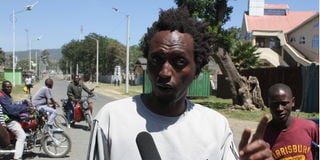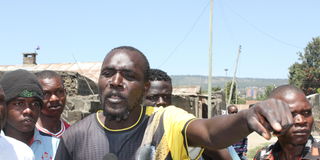Sudden blessing of fish in Lake Nakuru slowly turns into deadly curse

Dennis Kunga during an interview with Mtaa Wangu.
Tension between Kenya Wildlife Service (KWS) officers in Lake Nakuru National Park and the residents of Kivumbini, Manyani, Lake View, and Rhonda have steadily escalated over time.
The situation, which has been brewing for years seems to have reached its boiling point, with the mysterious disappearance of Brian Odhiambo ten days ago.
This event acted as the catalyst, triggering widespread unrest and transforming what was once a series of isolated issues, into a large-scale war between the KWS and the surrounding communities.
What was already a fragile peace now feels like a ticking time bomb, ready to explode at any moment.
Dennis Kunga, a resident of Kivumbini, takes us back some eight years ago.
Kunga paints a picture of desperation, a community that had lost all hope with many of the youth turning into crime to be able to make ends meet. Nevertheless, a tragedy that occurred during that period was a blessing in disguise for the locals.
“During that time, we heard news that a dam which had fish somewhere in Njoro had overflowed due to heavy rains at the time, and that the fish somehow made their way into Lake Nakuru. We were very excited. The community that was once dull had now found a new breath of life,” he says.
Kunga continues, “Many of the youth at the time turned to fishing. Since they could not do it in large scale they (youth) would go to the lake and come back with two or three fish that would be able to sustain them. In a way, this made a very huge difference,” he says.
With time however, this newly found economic activity started becoming a problem as KWS rangers would apprehend those who would go into the Lake to fish and beat them badly.
“In other instances, once they apprehend you, they would tell you to eat the fish raw,” he laments.
According to Kunga, these stories of torture escalated resulting in numerous complaints from the locals about how they are treated by the rangers.
The Human Rights Activist says, “In Brian’s case, he used to go into the Lake to just take some three to five fish that he sells and maybe use the rest to feed his family. On that fateful day as he was heading to the lake, the KWS rangers saw him and so he ran outside the park. The officers still pursued him and apprehended him.”
Kennedy Otieno, another resident of Kivumbini, says that he knew Brian personally and that they were friends.

Kennedy Otieno during an interview with Mtaa Wangu.
In a previous interview with Mtaa Wangu, he narrates how he saw Brian being whisked away by the KWS officers.
“I am a hustler. Sometimes I would go into the lake to take two or three fish to sustain my family. I can totally relate with where Brian was coming from and what drove him to go into the lake to fish, since I also have a young family that I need to take care of,” he says.
Ramadhan Juma, another resident, says how many of the youth in the area left crime and ventured into fishing as a source of livelihood.

Ramadhan Juma during an interview with Mtaa Wangu.
“Many of us do not have jobs yet we have children who depend on us. We cannot bear to see our families go hungry yet there is fish in the lake. We are never arrested for poaching, it has always been fishing and after the arrest the fish you are caught with are not taken into evidence. They are sold by the officers,” he says.
Both Kennedy and Ramadhan paint a picture of a community stuck between a rock and a hard place, with desperation being their motivation to fish in the lake.
During our interview with Dennis Kunga, he reveals how big fish vendors have joined the game.
“Over time, we started noticing large trucks making their way into the Park and coming out with truckloads of fish that were stored in coolants. At first, they would use the gate near the sewerage works. With time, they even started using the main Park gate. Even if you ask around, people will tell you how late into the night and early in the morning, trucks with coolers are seen ferrying fish from the park,” he says.
Kunga poses the question: Why is it that those who are “big players” in the game are allowed to remove fish from the park, yet a man who goes for some two or three fish to feed his family, is treated in such a manner?
We also spoke to the Flamingo ward area Member of County Assembly (MCA), Dennis Muraya who confirmed what Dennis shared with us.

Dennis Muraya, Area MCA Flamingo Ward during an interview with Mtaa Wangu.
“What kind of permit do these people have that allows them to do fishing of such a magnitude whereas the young men cannot do the same? The County shoul allow our youth to go into the Lake and fish and in return they pay a license fee to either the National or County government. This will be beneficial for both the young men and also the government as a whole,” he says.
Today, all eyes will be at the Nakuru law courts, waiting for Brian Odhiambo to be presented as per the court’s directive.

